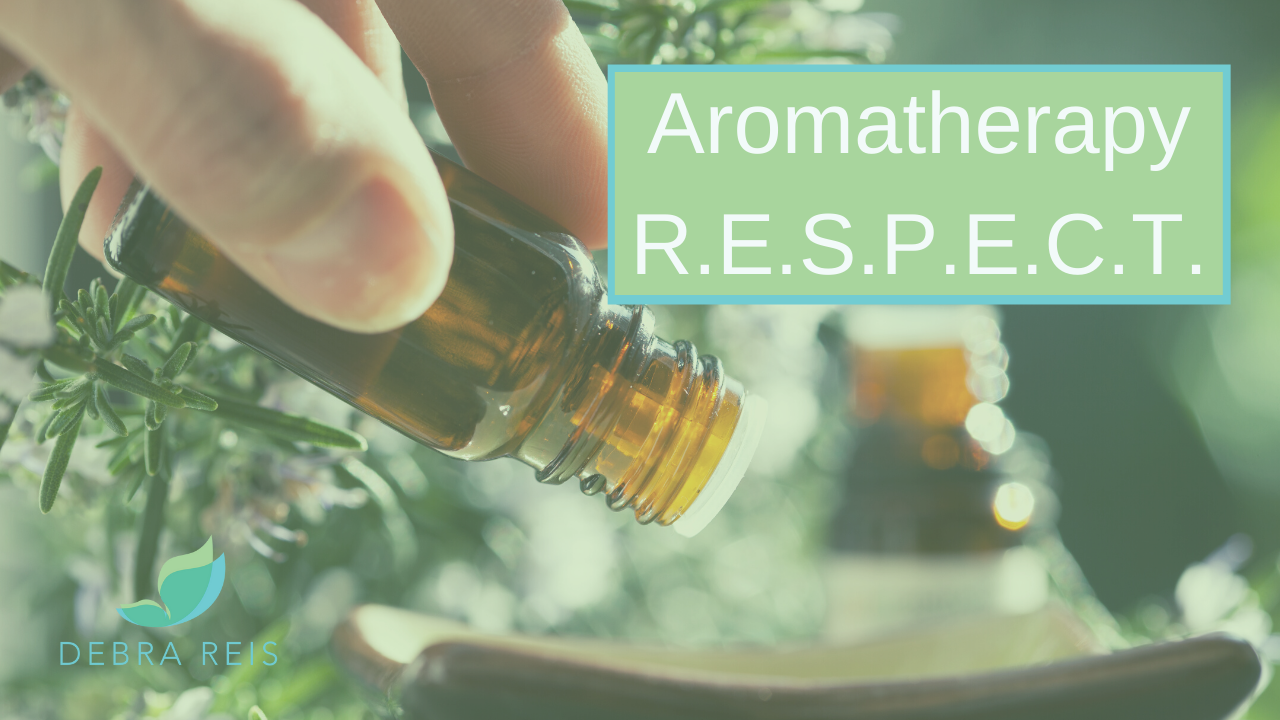Aromatherapy R.E.S.P.E.C.T.
Mar 03, 2022
Effective & Safe Aromatherapy Blending Commands R-E-S-P-E-C-T
Have you heard that Aretha Franklin song, R-E-S-P-E-C-T?
It’s catchy and comes up in my head when a little respect should be considered for a particular topic.
Allow me to give you a little background to my respect story. I was in a large group discussing holistic therapies, and we talked about using holistic therapies with people diagnosed with cancer. Aromatherapy came up as a “hot” topic in practice in private healing sessions and clinical settings.
The Aromatherapy Blend Gave Me A “Nails on The Blackboard” Reaction
One of the leaders in the group shared an aromatherapy blend she created to use with her clients who were dealing with a cancer diagnosis. The mixture included 5 different essential oils for a total of 75 drops of oils! These essential oils were in a rollerball container with 10 ml (2 teaspoons) of carrier oil (coconut oil). Clients were encouraged to use the blend over areas of concern a couple of times a day.
My brain is going crazy - what did I just hear? This practice is NOT safe! I get chills down my spine like nails on the blackboard. Ok, I control my facial expressions, catch my breath, and regain composure. I realize this person is not a clinical aromatherapist, and although she means well, she is potentially causing harm to others. In addition, this blend was complex, outside of standard guidelines, and shared with an audience who had little, if any, aromatherapy background. The blend's strength could interfere with medications, cause skin irritation, or cause other concerns.
Less is More for Beginning Aromatherapy Blending
I was able to share my experience after this person spoke. In my clinical setting, we recently completed a study on the use of Frankincense oil (Boswellia carteri) for chemotherapy-related fatigue. We used 5 drops of Frankincense in 5 ml (1 teaspoon) of jojoba carrier oil.
The participants  were to use 2 drops of the mixture on the soles of their feet morning and evening for a specified period.
were to use 2 drops of the mixture on the soles of their feet morning and evening for a specified period.
The maximum number of days the participant applied this oil mixture would be 9 days.
This example gives the audience a clearer perspective of using oils with practical outcomes, which is much easier to use and remember.
This blend of 5 drops of essential oils in 5 ml of carrier equates to a 5% dilution. According to our aromatherapy organizations 1, 2, a 5% dilution is the maximum amount to be applied topically. Some suggest that the dilution should be 2-3% for topical use in the clinical setting. The blend of 75 drops in 10 ml of coconut oil would be higher than 30% dilution and outside of the recommended standards.
Recipe Revise That Meets Our Safety Guidelines
Let’s go back to my colleague who shared the blend with 75 drops of essential oils in 2 teaspoons or 10 ml of coconut oil.
Taking her idea for immune balance, let’s use the essential oils suggested but place them into the formula that meets our safety guidelines for a 5% dilution:

Aromatherapy Respect Necessary for Proper Blending & Safety
When you show care for another, you are giving them your respect. You should be able to trust and respect outcomes from products, like your essential oils, that you use in providing care for another. To learn about aromatherapy, begin your research with 1-2 essential oils and add as you gain education and confidence. Education is key to using aromatherapy safely and generating the respect to include it as part of a health plan and service in clinical practice. Knowing the purpose of the essential oils you use, and the safe direction of using aromatherapy gives you the respect to share this valuable tool with others.
References:
(1) AIA - Alliance of International Aromatherapists - https://www.alliance-aromatherapists.org/
(2) NAHA - National Association Holistic Aromatherapy - https://naha.org/
This blog is provided for educational and informational purposes only and is not medical, mental health, or healthcare advice. Although Debra Reis is a Clinical Nurse Specialist licensed in the state of Michigan, she is not acting in that capacity here. Debra Reis is acting as a holistic educator and consultant, not as a licensed medical health professional or in her professional capacity as a Clinical Nurse Specialist. The information presented here is not intended to diagnose, treat, heal, cure or prevent any illness, medical condition, or mental or emotional condition. Working with us is not a guarantee of any results. Debra Reis, Wellness Services, LLC owns all copyrights to the materials presented here unless otherwise noted.
Stay connected with news and updates!
Join our mailing list to receive the latest news and updates.
Don't worry, your information will not be shared.





